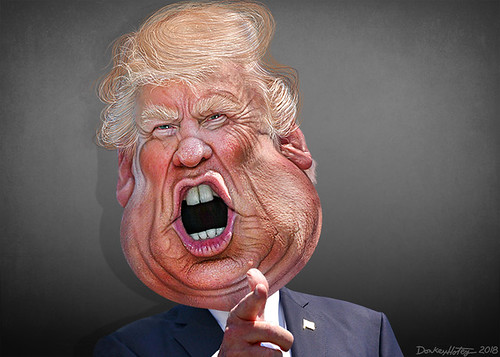From Asia Times
From its office in Paris, out of sight of the drama of US President Donald Trump's European adventure, the International Energy Agency's Oil Market Report makes for sober reading. Its June report suggests that the oil market will be "finely balanced next year," which is a polite way of saying that it will be turbulent and -- in essence -- a mess.
The embargoes of Iran and Venezuela have already set the oil market on edge, with Libya's continued disruption making things very tight. Any further problem, the IEA says, and the price of oil is likely to spike out of control. Brent crude, the index for oil prices, could whip from today's price of just above US$70 a barrel to $250 a barrel.
Trump's war on IranThe main point of disruption is the policy of the United States against Iran. In May, Trump jettisoned US commitments to the 2015 nuclear deal with Iran. He called for a total embargo of Iranian oil exports by this November.
Iran relies on the export of oil. In May, as a result of the nuclear deal, Iran's oil exports rose to a high point of 2.7 million barrels per day (mbpd). In February, Iran's Oil Ministry said the country had hoped to raise this to 4.7mbpd within the next four years. But now it is likely that Iran's oil will be substantially offline. This will have catastrophic effects for Iran, certainly, but also for the price of oil outside Iran.
Iran has hoped that its Asian buyers -- who purchase the bulk of Iranian oil -- will not follow US sanctions. The Iranians have pinned their hopes on China, which buys most of the oil, as well as on India and Turkey. Already, Iran's two other main buyers -- Japan and South Korea -- have begun to cut their oil imports.
China has indicated that it would not honor the US sanctions. It is likely that the so-called petro-yuan will become a lifeline for the Iranian economy. This new mechanism for pricing oil remains outside the US dollar's institutions, and not so exposed to US pressure.
India, vulnerable to US pressure, has said it would only buy Iranian oil if it is able to get a waiver against sanctions from the US government. Turkey has also indicated that it would like to get a waiver, although it is likely that Ankara will also try to push against the sanctions regime.
When Trump was in Europe, he reminded the Europeans about the sanctions and the new US posture toward Iran. European companies that are integrated into the US economy are unlikely to challenge the sanctions against Iran.
After Trump made his remarks in May, the presidents of Russia and France said they would protect their companies from US sanctions, since they did not agree with the withdrawal from the nuclear deal. But neither Vladimir Putin nor Emmanuel Macron has the pulse of his own businesses. Total (France) and Severstal (Russia) have already walked away from doing business with Iran. More will follow.
The Iranian government is watching its buyers buckle under the pressure from Trump and the United States government. If Iranian oil exports decline to 700,000 barrels per day or even lower, its treasury will be swiftly depleted. Even that amount is only possible if China -- which imports 650,000 bpd -- actually stands up to the United States.
Devaluation of the rial by the Central Bank of Iran in March and April -- prior to Trump's May announcement -- already showed the vulnerability of the Iranian economy. Fleeing the cash economy, those Iranians with cash in hand have gone to the gold coin market, to the real-estate market and into unofficial foreign-exchange markets (a three-tier exchange rate system is now in operation -- a harbinger of serious monetary problems). These Iranians are looking for somewhere to preserve their threatened value as the peril of economic collapse stares Iran in the face.
When prices rise ...This November, the United States will have a midterm election. It is an axiom of politics in the United States that high oil prices produce murder at the polls. Jimmy Carter faced re-election in 1980 with gasoline prices at $1.25 per gallon (or, adjusted for inflation to March 2018 dollars, at $3.89 per gallon, or $1.03 per liter). The gas price is currently at $2.88 -- about a dollar less than the price faced by Carter in his ill-fated attempt at re-election.
The Trump administration has said that it wants purchases of Iranian oil to come to zero by November 4, 2018. Two days later, the US electorate will go to the polls. If prices rise as a consequence of the drawdown of purchases from Iran, it will have an impact on the polls. Trump and his team recognize the idiocy of lifting oil prices just before an important election. This is why the US government is pushing for at least three means to keep prices reasonably low.
- Waivers. US Treasury Secretary Steve Mnuchin indicated this week that the Trump administration would "consider exceptions" to the sanctions regime against Iran. This would be a return to the policy followed by the Barack Obama administration -- it allowed waivers to any country that could show that it was making good-faith attempts to cut its oil purchases from Iran. The standard was high -- imports had to fall by 20% every 180 days. Mnuchin's remarks suggest that the Trump administration will take some sort of action that mimics the Obama policy. Japan, South Korea and the Europeans have been eager for the Trump administration to make this gesture. It would at least put off their own problems with energy supply.
(Note: You can view every article as one long page if you sign up as an Advocate Member, or higher).






